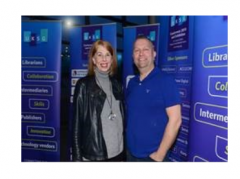Time continues to slip by at an ever-increasing pace, and we are rapidly heading for the end of the first quarter of 2023. As the world continues to return to a new post-pandemic ‘normal’, our annual Conference will soon be upon us, and we look forward to catching up with faces old and new in person in Glasgow again.
Since we wrote our last editorial back in autumn 2022, we have continued to explore the world of scholarly publishing, and we have been fortunate enough to be able to introduce you to two new toolkits designed help the community. Alicia Wise introduced us to a new toolkit that has been created to help libraries and small independent publishers negotiate and implement transformative agreements, while Katherine Skinner and Sarah Lippincott’s article introduced the FOREST Framework for Values-Driven Scholarly Communication, a toolkit and approach developed by the Next Generation Library Publishing project to assess a community or organization’s alignment with scholarly values and principles.
Aligned with our continuing look at global publishing issues, Dominic Dankwah Agyei, Modibo Sangare, Felix Emeka Anyiam, Pasipanodya Ian Machingura Ruredzo, Janith Warnasekara and Richard F Heller explored the landscape and challenges of open access publishing of public health research in African journals.
Of interest, no doubt, to our publisher colleagues as well as librarians, Andreas Nishikawa-Pacher’s article looked at how publishers engage with Twitter to support the promotion and usage of their scientific journals.
As libraries continue to wrangle with budgetary challenges and explore options for breaking out of ‘big deals’, Peter McCracken, Michael Levine-Clark, John McDonald and Jason Price’s article looked at how libraries can use a data-driven approach to valuing post-cancellation access (PCA) rights.
In the coming weeks, we look forward to bringing you Sara Parmhed and Johanna Säll’s librarian perspective on transformative agreements and their practical impact, while, on a similarly library-centric perspective, Lai Ma, Jane Buggle and Marie O’Neill will be asking whether OA has reached a crossroads in terms of library publishing and bibliodiversity.
For colleagues with a particular interest in research and scholarly publishing, Beth Montague-Helen and Kate Montague-Hellen brought us an article which questioned who is supporting UKRI-funded researchers to share data.
We are all aware that many researchers utilise Wikipedia as a significant research tool, whether in initial exploration of subjects or in widening their research, so Caroline Ball’s article exploring use of Wikipedia, questioning whether it should be considered as a primary, secondary, or tertiary resource, will be a fascinating read.
In the coming weeks Ben Catt and Kate Smith will be presenting a case study looking at how the University of York has been building a framework for open research skills, which, we are sure, will be of great interest to many of our readers.
We continue to cast our net wide to bring you articles of interest to everyone across the scholarly communications sector. Ethical and environmental considerations are forefront for many of us in our work and strategic planning, so we were please to bring you Peter Barr’s article which discussed how academic library acquisitions can become truly ethical.
On a lighter note, Alan Wheeler took a look at how you can encourage creative learning in the academic library context using Lego® Serious Play®, and this challenges traditional notions of how learning can or should take place. His article will be published shortly.
Over the coming months, amongst many fascinating articles, we will be bringing you an article by Richard Heller which looks at Plan E for Education, and attempts to tackle questions around open access to educational materials created in publicly funded universities. We’ll also be bringing you an article by Michelle Polchow on webinar review and how it is possible to integrate preservation into librarian workflows.
We hope that you will continue to enjoy reading Insights, and that you will find our articles inspiring and thought-provoking.
As ever, we are hugely grateful to all our committed and enthusiastic authors and peer reviewers who have worked so hard over the last year to ensure that Insights continues to bring you insightful and stimulating articles. But, don’t forget, you too can write for Insights! We’d still like to hear about your research projects, your case studies and your thoughts on whether there are hot topics in scholarly communications that we should be publishing on. Go on, get writing – or simply drop us a line with your thoughts!
Lorraine and Steve

